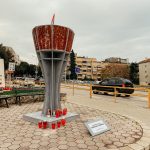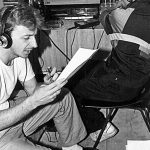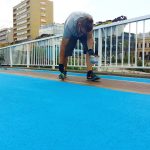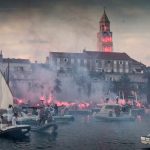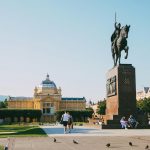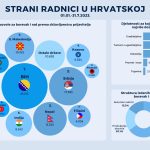November 18, 2023 – Now a tourist guide in the Vučedol Culture Muesum, in the spring of 1991, Siniša Đurić was a seven-year-old boy in the first grade of elementary school. And he saw and lived Vukovar on this day 32 years ago.
When he recalls those days, writes Glas Slavonije, he says he did not know much about the announcements of war, but even as a child, he felt that the atmosphere was changing in 1991, especially after the murder of Croatian policemen in Borovo in May.

“I Remember it All”
“I remember how we were stopped at the barricades on our way back from one of the neighboring towns. They asked my parents something, looked at my sister and me in the back seat of the car, and I felt that something was wrong. Soon enough, shots were heard in the distance, then the sound of explosions, and nothing was the same. Mom worked at the Vukovar hospital and ran from work to our apartment every day, she made sure that the shells didn’t hit the building. When the situation got very complicated, Dr. Vesna Bosanac told the employees to bring their families to the basement of the hospital,” recalls Siniša. He and his two years older sister were placed in the hospital basement, while his father went to defend the city.
He emphasized that even today he cannot explain the fact that he remembers everything from the war period, and some memories come back to him when he smells certain smells in the air. “My mom is also surprised that I remember it all, because we didn’t talk about it after leaving Vukovar. We always get nostalgic in the fall, and I’m always surprised that I remember some things in detail. I remember people, faces, and situations that happened in the hospital. Our childhood was abnormal, but it was the only one we knew about. We played hide-and-seek while the wounded lay around us and screams from the surgeries could be heard. I read the comic books they brought me while I could,” he stated.
When asked when the people felt that the situation in besieged Vukovar had changed so much that it was possible to sense the end of the defense, he answered that they probably hid it well from the children, but a few days before the end, the atmosphere in the hospital changed.
“Perhaps we children were not able to recognize all the emotions of adults. I do not know. However, a few days before the end, we also noticed that something bad was happening. When Berak, my mother’s birthplace, fell, her parents stayed in the village, and it was a huge shock to her. As the ring around Vukovar tightened, people became more and more aware, but there is something in a man that makes him keep hope until the very end, as long as there is any hope. In the beginning, we had enough food, but over time, there was less and less. I remember how a few days before the complete occupation I was given half a slice of bread for a meal, and my father, who was lying wounded in the hospital, was given a slice of bread and some soup. I told him I was hungry and he gave me his meal. Then he burst into tears because he couldn’t give me anything else. Today, as a parent, I often remember that,” said Đurić.

A Place to Live
He stated that after the Yugoslav People’s Army entered the hospital, a fight broke out. Everyone had to come to the yard, where, as he said, “the gentleman with the mustache”, who he later found out was Veselin Šljivančanin, arranged where everyone would go. “My father was with us children with his leg in a cast, and my mother took care of the wounded. My father was soon taken away from us and taken to a bus, and then my mother begged Šljivančanin to bring him back to be with us. Although the situation was chaotic, she was very persistent and managed to persuade him to let my father off that bus, so all four of us left the city on another bus. I think she saved his life because if he had stayed on that bus, he probably would have ended up in Ovčara. We spent the night in Srijemska Mitrovica and then returned to Croatia”.
Since they had no relatives in other parts of Croatia, that is, most of them were in places around Vukovar, and it was questionable how safe it was to be there, they got off the bus in Bjelovar, where they were first placed in a sports hall. Later, an old woman invited them to come and live with her until they could find their way, so they stayed until they were provided with accommodation in another apartment.
“Mom returned to Vukovar at the beginning of the peaceful reintegration period, and we came in 2000. Coming from a town like Bjelovar to a half-empty ruined town with little content for young people was a new shock. Still, even back then I knew how I would stay here. Maybe somewhere else I would have more in terms of material wealth, but my soul would not be at peace. As the years passed, I guess someone in the state realized that Vukovar had given what it should have given, and investments began to make it a decent and nice place to live today,” Siniša concluded.
I Have Enough for my Family, I Don’t Need More
Since he studied journalism, Siniša first worked for Radio Vukovar, and then got a job at the Vučedol Culture Museum, where he still works as a guide. He points out that the words of those who come to the city occasionally, or tourists from distant countries who know almost nothing about the city’s suffering further confirm to him how much Vukovar’s image has improved.
“I work in tourism and culture, and I really don’t see myself anywhere else. I love my job, especially when I take the role of a tourist guide in the city. Tourists are delighted with what I tell them because it is the testimony of someone who survived the hell of war and not inflated facts from history lessons.
My children are small, they are 11 and six years old, and I hope that, like me, they will find their way in life in Vukovar or Slavonia. I’m not rich, I have enough for my family and a normal life, and I don’t need more than that,” said Siniša, who often organizes humanitarian actions to help the needy, including the social supermarket in Vukovar. He points out how terrible it is to hear that after 40 years of work, people can’t even feed themselves with their pensions.
“I was hungry in 1991, and I know what it feels like. Not hungry because you want to lose a few kilos, but hungry because you literally have nothing to eat. I am especially weak with children, and when I hear that someone needs something, I jump in to help. People in need should be shown that they are not alone. Some of them are either too proud to ask or don’t know where to turn for help,” he emphasized.

We Aren’t Many, Let’s Stay United
Asked about what “derails” him, he said that he is annoyed with people who tell the people of Vukovar how they should live and what to do to make their lives better, as well as those who love Vukovar only when it’s convenient. “It disgusts me to hear people arguing about the order in which they will lay the wreath in some protocol. I am not a moral authority, nor do I set myself up as such, but there are a lot of beautiful things here, and people who work hard, and their work is hard to see. Wrong stories are getting out into the public; wrong people are beating their chests and grabbing the microphone. I have the impression that we have more committees than problems and it is incomprehensible to me that, instead of everyone coming to the Parade of Remembrance and walking with reverence, we have to listen to fights over posters for days. It is clear that those who defended the city and their children should be in the first ranks. There are not many of us, so why would there be any division”, says Siniša, adding that the suffering should be commemorated without drama and political arguments.
I’ll Fight for the Children of Our City
According to his assessment, Vukovar is not a divided city, but those who lost their loved ones in the Homeland War feel immense pain that is not diminished by the passage of time. “The worst thing is when politicians look at who sat down with whom for coffee before the election. I’m apolitical, and I don’t understand that, but I’m sure that every division is initiated out of self-interest. I would like us to focus more on the future and children together. We have a lot of gifted children, and they need to be provided with the conditions to develop their talent. Therefore, as far as I can, I will fight for all the children of this city, that is, for the opening of a school of excellence or a center for gifted children. If they have them in Zagreb, there should be one in Vukovar as well, and children must be our priority. We have suffered enough being from Vukovar; our children do not need to be deprived of anything now. Shall we invest in monuments or in children, who can return it a hundredfold? For me, the answer is completely clear,” he said.

